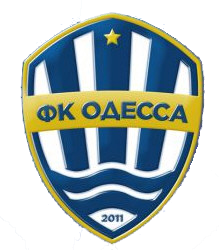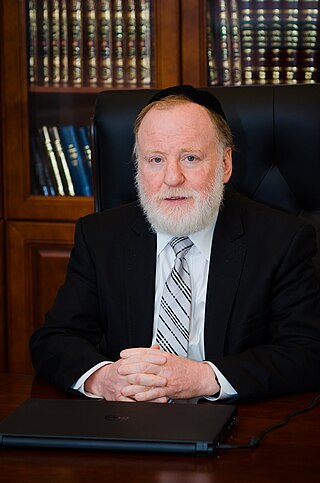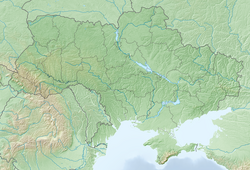
Odesa is the third most populous city and municipality in Ukraine and a major seaport and transport hub located in the south-west of the country, on the northwestern shore of the Black Sea. The city is also the administrative centre of the Odesa Raion and Odesa Oblast, as well as a multiethnic cultural centre. As of January 2021, Odesa's population was approximately 1,010,537. On 25 January 2023, its historic city centre was declared a World Heritage Site and added to the List of World Heritage in Danger by the UNESCO World Heritage Committee in recognition of its influence on cinema, literature, and the arts. The declaration was made in response to the bombing of Odesa during the 2022 Russian invasion of Ukraine, which has damaged or destroyed buildings across the city.

Brody is a city in Zolochiv Raion, Lviv Oblast, western Ukraine. It is located in the valley of the upper Styr River, approximately 90 kilometres northeast of the oblast capital, Lviv. Brody hosts the administration of Brody urban hromada, one of the hromadas of Ukraine. Population: 23,134.

FC Odesa was a professional Ukrainian football club based in Odesa. The club plays in blue-white colors. The club originally was called Dnister and played in Ovidiopol but after the 2010–11 season the club moved to Odesa.
The culture of Odesa is a unique blend of Russian, Yiddish, and Ukrainian cultures, and Odesa itself has played a notable role in Russian and Yiddish folklore.

The Ukrainian Marine Corps, also known simply as the Ukrainian Marines, is the maritime land force service branch of the Armed Forces of Ukraine since 2023, responsible for conducting expeditionary and amphibious operations. From its modern foundation in 1993 up to 2023 it constituted part of the Coastal Forces of the Ukrainian Navy. It is used as a component part of amphibious, airborne and amphibious-airborne operations, alone or in coordination with formations and units of the Ground Forces in order to capture parts of the seashore, islands, ports, fleet bases, coast airfields and other coast objects from the enemy. It can also be used to defend naval bases, vital shoreline areas, separate islands and coast objects, and security of hostile areas.

The Brodsky Synagogue, also called the Brodsky Choral Synagogue, is an Orthodox Jewish synagogue located in Kyiv, Ukraine.

The Jewish community of Brody was one of the oldest and best-known Jewish communities in the western part of Ukraine. The Jewish community of Brody perished in the Holocaust in 1942–1943. During the 19th century, Brody was the second-largest city in East Galicia, with the highest proportion of the Jewish population (88%) among Eastern European cities.
Said Belmokhtar is a Ukrainian footballer who played as a forward.
The following is a timeline of the history of the city of Odessa, Ukraine.

In early 2014, there were clashes between rival groups of protestors in the Ukrainian city of Odesa, during the pro-Russian unrest that followed the Ukrainian Revolution. The street clashes were between pro-unity protesters and anti-government (anti-Maidan), pro-Russian protesters. Violence erupted on 2 May, when a 'United Ukraine' rally was attacked by pro-Russian separatists. Stones, petrol bombs and gunfire were exchanged; two pro-Ukraine activists and four pro-Russia activists were shot dead in the clashes. The pro-Ukraine protesters then moved to dismantle a pro-Russian protest camp in Kulykove Pole, causing some pro-Russian activists to barricade themselves in the nearby Trade Unions House. Shots were fired by both sides, and the pro-Ukraine protesters attempted to storm the building, which caught fire as the two groups threw petrol bombs at each other.

Rabbi Shlomo Baksht is an Israeli-Ukrainian rabbi. He serves as Litvish rabbi in Odesa and Odesa Oblast and as the head of Odesa's Litvish community. He contributed to the dissemination and popularization of traditional Jewish values among the Jews of Odesa.

Monument to the founders of Odesa, also known as the monument to Empress Catherine II of Russia and her companions, was a monument located in Odesa, Ukraine, on Katerynska Square.
Vasiliy Ryabchenko is a Ukrainian painter, photographer, and installation artist. One of the key artists in contemporary Ukrainian art, and the "New Ukrainian Wave".

The Monument to the Unknown Sailor is a city memorial located at Shevchenko Park in the Southern Ukrainian city of Odesa. It is part of the park's Alley of Glory, with the graves of fallen sailors on each side. An eternal flame is burning at foot of the monument.

Bet Sima Synagogue or Vladivostok Synagogue is a Jewish synagogue in the Russian city of Vladivostok and the only synagogue in Primorsky Krai. It is the oldest continuously operating synagogue in the Russian Far East.
The fence exhibition is an exhibition of young artists Stanislav Sychov and Valentin Khrushch, organized in Odesa on 8 May 1967, on the fence of the Odesa Opera House.

The history of the Jews in Odesa dates to 16th century. Since the modern city's founding in 1795, Odesa has been home to one of the largest population of Jews in what is today Ukraine. They comprised the largest ethno-religious group in the region throughout most of the 19th century and until the mid-20th century.
Pavlo Kozlenko is a historian, lawyer, PhD, Honored Worker of Culture of Ukraine, researcher of the Holocaust and Jewish heritage during Roman occupation of Ukraine during World War II. Director of Odesa Holocaust – Victims of Fascism Museum, vice-president of Charity Foundation "Memory of Nazi Victims" (2011–2022), member of Coordination Council of Association of Jewish Organizations and Communities of Ukraine, member of the Public Council of the State Archives of Odesa Region, elected member Public Council under the Odesa Regional State Administration of 2 convocations, poet. He is an author of books, scientific articles, and exhibitions about history of Holocaust, a participant of ethnographic expeditions to the former places of compact residence of Jews in the South of Ukraine, an active community member. Acts as an official opponent at the defense of dissertations, a member of the jury of the city competition of the Department of Science and Education of the Odesa City Council for the professional skills of teachers "Tolerance - the lessons of the Holocaust". President of the Charitable Foundation "Pam’yat. Gidnist. Svoboda". Member of the editorial board of the newspaper "Dobroe delo".

The Museum of the History of Odesa Jews or the "Migdal-Shorashim" is a historical museum in Odesa, Ukraine. It reflects the history of the Jews from their first settlement in Odesa to their impacts in the city in the modern age. It is located on 66 Nezhinskaya Street.
The Zhukovka Jewish Cultural and Religious Center (JCC Zhukovka) is the largest Jewish community center of Orthodox Judaism in Russia. It was established in 2015 in the Zhukovka village of the Pervomayskoye Settlement of Moscow; it is situated at the Rublyovo-Uspenskoye Highway.















